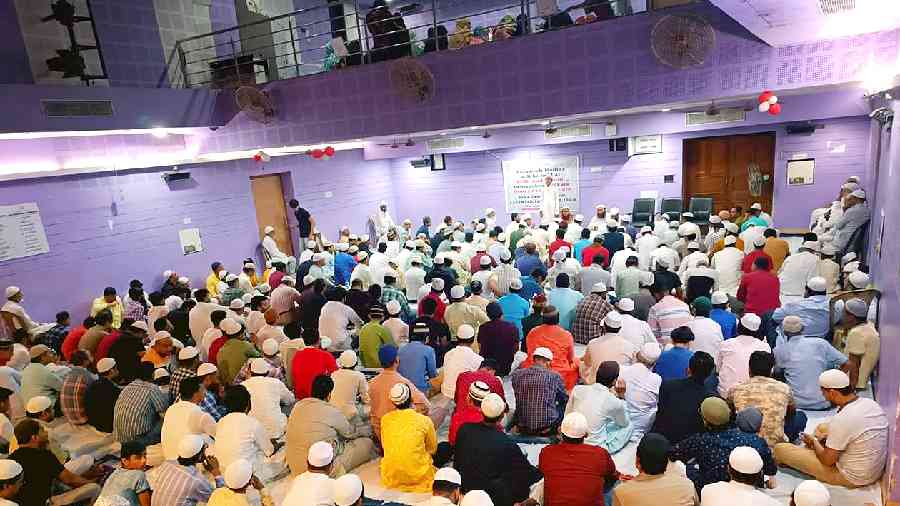Muslim community leaders have been using prayer meetings and social workers are taking to the streets to urge restraint at a time provocation has led to flare-ups on the fringes of Kolkata.
The month of Ramazan calls for restraint, patience and brotherhood, they are telling followers.
On Monday, a prayer meeting at a mosque in central Kolkata’s Beniapukur, near Milli Al-Ameen College, saw a gathering of over 200 people.
“We have to be alert. Some troublemakers are trying to create tension. But we should pledge that none of us will play into their hands,” Rafay Siddiqui, a resident of the area and social worker, quoted the imam as telling the gathering.
On Ram Navami, a handful of people in a rally, while passing by a mosque near the Park Circus seven-point crossing, were shouting aggressive slogans, alleged Siddiqui. “The residents showed restraint. Nothing untoward happened. Police came soon and moved away some of the marchers,” he said.
The imam of Nakhoda mosque, Shafique Qasmi, has also been talking about peace and brotherhood in the prayer meetings at the biggest mosque in Kolkata. “Ramazan teaches restraint, patience, peace and brotherhood. Every person is free. But only to the extent of not harming anyone else. No one is free to create communal tension,” he told The Telegraph.
The road on which the majestic mosque stands also hosts Kolkata’s biggest Ramazan market. People from all over the city, many of them non-Muslims, throng Zakaria Street during Ramazan, mainly for iftar delicacies like haleem, kebabs, sewai, bakarkhani (a type of bun), sheermal (a type of sweet bread). Social media is replete with pictures of food bloggers on Zakaria Street, which every year reaffirms the character of Kolkata.
About 25km away, clashes were reported from Rishra in Hooghly district on Monday night. Violence has been reported from parts of West Bengal, especially in Howrah and Hooghly, for the past few days.
Chief minister Mamata Banerjee has accused the BJP and the saffron ecosystem of trying to polarise people by triggering communal flareups. BJP leaders have trained their guns on Mamata, levelling the old allegation of minority appeasement.
The religious leaders and social workers in Kolkata are advising people not to let their guard down because the communal forces will look for opportunities to stoke tension again on Hanuman Jayanti, scheduled for April 6 (Thursday).
Muhammad Kalim, a member of Belgachhia Aman (peace) Committee, a group that works for communal harmony in northern neighbourhoods of Kolkata such as Belgachhia, Paikpara and Tallah Park, said “no matter what, the communal forces will be defeated”.
Kalim and his colleagues have been regularly touring the neighbourhoods and talking to as many people as possible, both Hindus and Muslims, because they think “interaction is the key” to harmony.
“Ram ke naam pe fasaad nahi chahiye (We don’t want trouble in the name of Ram),” he said.
In Belgachhia Basti, adjoining the Belgachhia Jama Masjid, a predominantly Muslim settlement, a handful of Hindus run grocery stores and other shops.
“We have been regularly visiting them to allay any kind of fears. They are our brothers and we are telling them as much,” said Kalim.
A veteran member of the Sikh community in Kolkatasaid the aggressive sloganeering and brandishing weapons to celebrate Ram Navami was “unbecoming” of Kolkata. “I have never seen sloganeering in the name of religious festivals,” said the man, in his fifties.
A couple of days ago, he was driving past a mosque in south Kolkata. “I saw a couple of saffron flags tied to a railing near the mosque. I could not see any other saffron flag anywhere else in the vicinity. These are dirty tricks, not usual in this city,” he said.
Kushal Debnath, a veteran human rights crusader who lives in southwest Kolkata’s Metiabruz, works throughout the year for communal amity in the minority-dominated pocket, often labelled mini-Pakistan by the Right-wing ecosystem.
“There is no chance of communal riots across the state because Muslims will not give in to provocation in the month of Ramazan and also because the majority of Hindus don’t want religious polarisation,” said Debnath.
Qari Fazlur Rahman, one of the senior-most maulanas in West Bengal who leads the Id prayers on Red Road, urged members of all communities to stick to the “culture of Bengal”.
“We don’t have to do anything else. Just keep living like we have been living for so long. Brotherhood and communal amity are ingrained in this soil,” he said.
